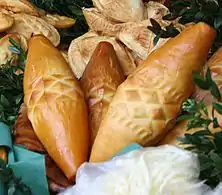List of Polish cheeses
This is a list of cheeses from Poland. The history of cheesemaking in Poland goes back to 5500 BC, when cheese similar to mozzarella was produced in Neolithic times in Kujawy (north-central Poland).[1][2]
Poland is the 6th largest cheese producer in the world and has the 18th highest cheese consumption. Marek Kosmulski described over 600 types of Polish cheeses manufactured between 1948 and 2019.[3]
Some Polish cheeses are protected by European Union law as regional products.
Polish cheeses
| Name | Image | Region | Description |
|---|---|---|---|
| Bałtycki | Polish brand of cheese.[4] | ||
| Bryndza |  |
Sheep milk cheese made in Poland, Slovakia.[5] Recipes differ slightly across the countries.[6] | |
| Bryndza Podhalańska | Podhale region. | Polish variety of the soft cheese bryndza. It is prepared with sheep milk and was registered in the European Union's Register of protected designations of origin and protected geographical indications on June 11, 2007[7] as a Protected Designation of Origin (PDO). | |
| Bundz | Traditionally produced in Podhale. | A sheep milk cheese. | |
| Bursztyn | A brand of cheese.[8] It is a mature cheese similar to Gruyere. | ||
| Edamski | Mazuria. | A rennet cheese based on Dutch Edammer. | |
| Farmer cheese |  |
In Poland, farmer cheese is similar in consistency to cottage cheese.[9] The cheese is formed into a loaf.[9] It is sometimes referred to as "pot cheese."[10] | |
| Gołka |  |
Silesian Voivodeship. | Similar to oscypek, but made with milk from cattle. |
| Gryficki | Gryfice Dairy, province of Szczecin.[11] | Production began in 1973.[11] | |
| Hauskyjza |  |
Wielkopolska, Pomerania, Kuyavia, and Silesia. | Foodstuff made of cottage cheese, caraway and other ingredients, which are mixed, put aside for a few days to acquire the characteristic sharp flavor and tacky consistency, and then warmed and fried. |
| Kortowski [12] | |||
| Koryciński |  |
Podlaskie Voivodeship in eastern Poland. | Hard yellow cheese made from cows' milk. Named after the town of Korycin. |
| Królewski | Northwestern Masovia. | "Royal cheese"; similar in taste and appearance to Swiss Emmental. | |
| Liliput | Wielkopolska. | A cows' milk cheese.[13] | |
| Lechicki | Known in Poland as Brochocki cheese, which derives from the name of the farmer who began producing it. | ||
| Łowicki [14] | |||
| Lubuski | |||
| Mazurski | A brand of cheese. | ||
| Morski | Mild, semi-soft cheese made from pasteurized cow's milk. Melts well, often used as a table cheese. | ||
| Oscypek |  |
Made exclusively in the Tatra Mountains region of Poland. | Smoked sheep milk cheese, there is also a smaller form called redykołka, known as the 'younger sister' of oscypek. |
| Przeworski | A rennet cheese, classified as ripening, produced from cow's milk and an infusion of mint and marjoram. It has a delicately spicy taste and an aroma of herbs. Named after the town of Przeworsk in the Subcarpathian Voivodeship. | ||
| Radamer | From Polesie. | A cows' milk cheese, with Dutch and Swiss influence.[15] | |
| Redykołka | Produced in the Podhale region. | Sometimes known as the "younger sister" of Oscypek and the two are occasionally confused. The cheese is often made in the shape of animals, hearts, or decorative wreaths. | |
| Rokpol |  |
Wielkopolska. | Polish blue cheese similar to Danish blue cheeses. The name derives from Roquefort and suggests that it is a Polish Roquefort, however, it is made with cows' milk.[16] |
| Słupski chłopczyk | Produced in Słupsk. | A Camembert-type cheese, produced before the second world war, reintroduced in 2007, but the production was stopped in 2013. | |
| Twaróg |  |
Also known as ser biały.[17] Pictured is Polish twaróg in the traditional wedge shape. | |
| Tylżycki | Mazuria.[18] | A yellow cheese made from cow's milk. A semi-hard cheese that is a variety of Tilsiter.[19] | |
| Zamojski | |||
| Zgorzelecki | A semi-hard, yellow cheese made from cows' milk. |
References
- ""Najstarsze sery świata z Polski" portal Archeowieści". Archived from the original on 2013-11-09. Retrieved 2013-11-09.
- "Na Kujawach robiono sery już 7 tys. lat temu" Źródło: PAP
- "Atlas serów polskich : Producenci i nazewnictwo serów w latach 1948–2019" Biblioteka Cyfrowa Politechniki Lubelskiej
- "Bałtycki ripening cheese". Osmozo.pl/. Retrieved 14 November 2013.
- "Cheese Description: Bryndza". Cheese.com. Retrieved 2008-06-11.
- "Bryndza - LeCheese". lecheese.app. Retrieved 2021-08-18.
- European Commission (2007-06-11). "Commission Regulation (EC) No 642/2007 of 11 June 2007 registering a name in the Register of protected designations of origin and protected geographical indications Bryndza Podhalańska (PDO)". Retrieved 2008-06-10.
- "Bursztyn". Oldpoland.pl. Archived from the original on 28 November 2014. Retrieved 14 November 2013.
- Polish Cooking – Marianna Olszewska Heberle. p. 91.
- From a Polish Country House Kitchen: 90 Recipes for the Ultimate Comfort Food - Anne Applebaum, Danielle Crittenden. p. 239.
- Proceedings from the Annual Marschall Invitational Italian Cheese Seminar
- Food Science and Technology Abstracts
- "Ser liliput wielkopolski - Ministerstwo Rolnictwa i Rozwoju Wsi - Portal Gov.pl". Ministerstwo Rolnictwa i Rozwoju Wsi (in Polish). Retrieved 2021-08-18.
- Zeszyty naukowe
- "8 Most Popular Polish Cheeses". www.tasteatlas.com. Retrieved 2021-08-18.
- "Rokpol - LeCheese". lecheese.app. Retrieved 2021-08-18.
- "Twaróg (Polish Farmer's Cheese)". Polish Housewife. 2016-09-25. Retrieved 2021-08-18.
- "Mazurian cuisine". www.poland.travel. Retrieved 2021-08-18.
- "Codex International Individual Standard For Tilsiter"
External links
 Media related to Cheese from Poland at Wikimedia Commons
Media related to Cheese from Poland at Wikimedia Commons
This article is issued from Wikipedia. The text is licensed under Creative Commons - Attribution - Sharealike. Additional terms may apply for the media files.